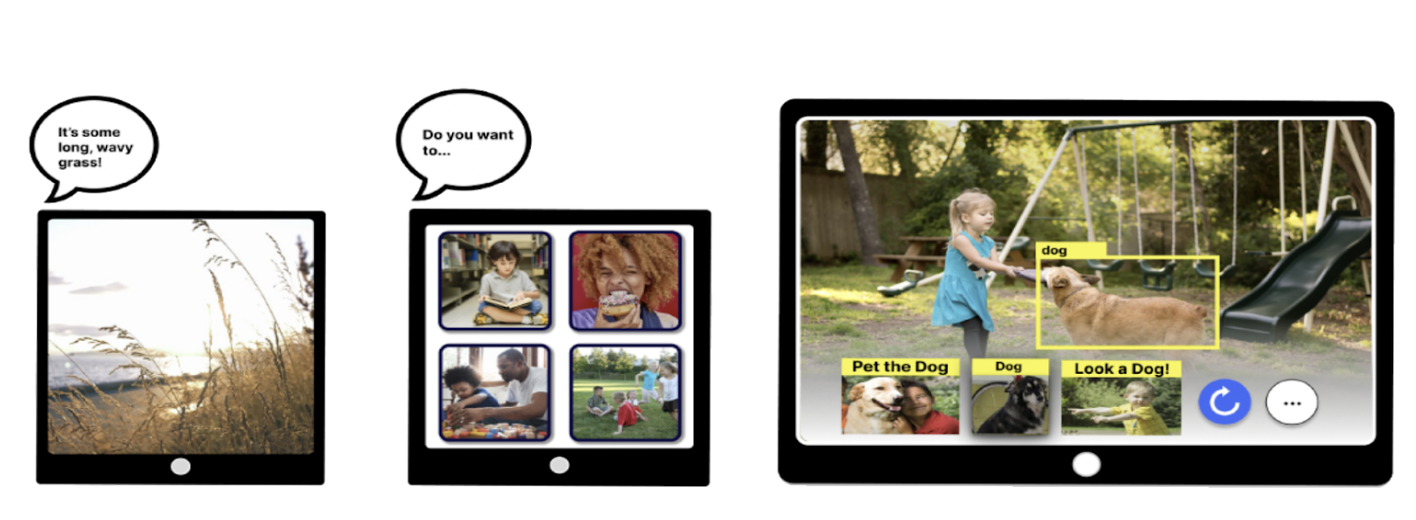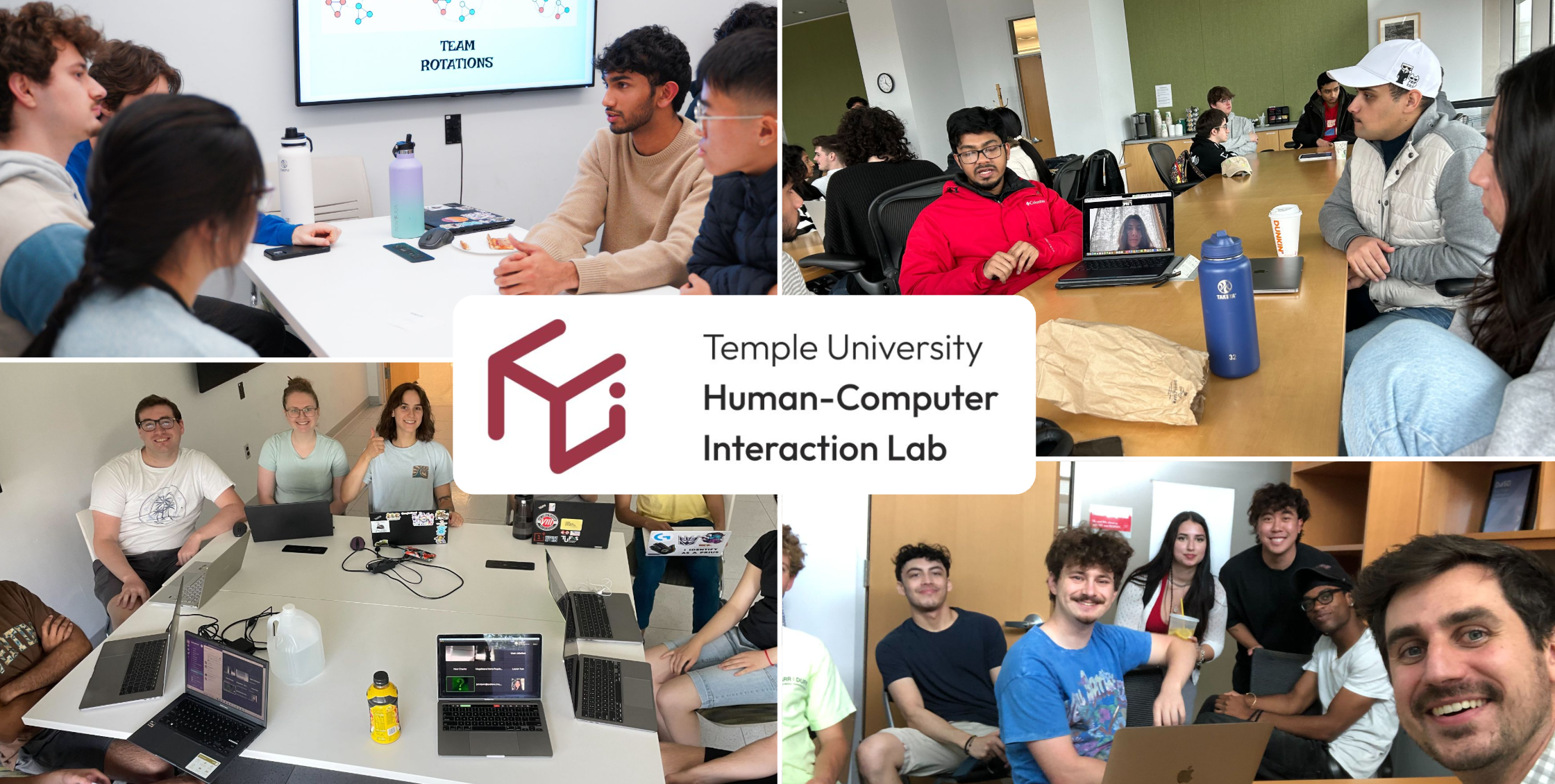
We are recruiting two PhD students to work on projects in the areas of assistive technology, human-computer interaction, participatory design, and learning sciences starting in 2026. Students interested in accessibility will get priority.
Our Current Research Focus
Our lab co-designs and critically evaluates technologies that empower people to express themselves and make their own choices. A major focus of our work is context-aware augmentative and alternative communication (AAC)—tools that support self-expression, learning, and independence for neurodiverse individuals and those with communication challenges. Some areas of research include:
Context-aware AAC systems. We develop AAC tools that can “see and understand” the user’s environment. By recognizing objects, people, and activities, these systems can provide just-in-time communication options.
New ways to engage autistic children. We investigate how AAC can extend beyond functional communication to create shared experiences. For example, we prototype games where AAC devices act as controllers, supporting collaborative play and encouraging social interaction
Generative AI for AAC. We explore how generative AI can support both AAC users and pre-service speech-language pathologists (SLPs). Our tools assist with rapid programming of personalized visual scene displays.

Some examples of our current projects include:
- Helping or Homogenizing? GenAI as a Design Partner to Pre-Service SLPs for Just-in-Time Programming of AAC
- Exploring Engagement Opportunities for Autistic Children: Using AAC as a Controller in a Wizard-of-Oz Coloring Game
- Neurodiversity in Computing Education Research: A Systematic Literature Review
- Exploring the use of generative AI to support automated just-in-time programming for visual scene displays
If you’re interested in designing empowering technologies and rethinking how AI and AAC can support human autonomy, we welcome you to join our research community.
Requirements
Given this ambitious and transdisciplinary focus, I am open to any research idea that relates broadly to my expertise and research goals. I strongly welcome students from a wide range of disciplines that include Computer Science, Design, Psychology, Public Policy, and Cognitive Science. Above all, PhD students in the lab should be excited to work in cross-functional teams where they lead by recognizing and amplifying the talents of those around them.
Students with a computing focus should have experience or interest in one or more of the following topics: information visualization, knowledge graphs, natural language processing, machine learning, or web development.
Students with a design or education focus should have experience with some of the following: experiment design, qualitative data analysis, user researcher, preparing design workshops, teaching, mentorship, design facilitation, UI design
HCI at Temple University
The Temple HCI Lab is the largest HCI Lab in Philadelphia with over 45 active members, including 6 PhD students. The Temple HCI Lab is also very active in the community, hosting OwlHacks, one of the largest hackathons in Philadelphia.There are now multiple HCI labs in the Philadelphia region including Temple HCI Lab, Penn HCI Lab, Princeton HCI Lab, and multiple labs at Drexel University. This surging regional investment in HCI research will hopefully lead to a community of researchers, practitioners, and educators who care about how people and technology interact. In the region, our lab is unique because we focus primarily on working with and for local communities. Come join me to work with local communities, city officials, and educators in Philadelphia!
Temple University is an R1 Research University located in the heart of Philadelphia. Over the last 5 years, the CS department at Temple has ranked 77th in the USA based on faculty citations. As one of two public universities in Philadelphia, Temple also deeply cares about positively impacting our city. This unique focus on scientific and social impact is a hallmark for our university and our lab.

Community Research Model
Our lab focuses on developing self-direction and leadership skills first and foremost. This aligns the collaborative nature of research and shifts the focus from research outputs to individual and community development. In our model, the measure of success is not just publications or prototypes, but also how effectively you enable others to succeed and contribute to the broader community we are building.
We view the lab as a space to grow with others, not in competition with them. Whether you’re mentoring an undergraduate, co-designing with a community partner, or collaborating across disciplines, you’ll be expected to practice inclusive leadership, active listening, and reflexive inquiry.
Our work with communities—particularly in Philadelphia—often involves:
Peer mentorship and layered leadership are core to how we work. Senior students guide new lab members, fostering a culture of learning, accountability, and support. Everyone is expected to grow both as an independent scholar and as a mentor who lifts others.
Cross-disciplinary collaboration is encouraged and celebrated. Computer scientists, designers, educators, and social scientists work side by side, learning to translate their skills into shared projects.
Co-designing with stakeholders is central to our research approach. We collaborate with AAC users, their friends, family, and clinicians to ground our projects in real community needs and return meaningful value to those we partner with.
How to Apply
You must apply and be admitted to Temple University to work with me as a PhD student.
You are also strongly encouraged to send me an email with the following:
- A PDF of your CV/Resume
- A short cover letter that briefly describes your interest in working with me and your favorite project you’ve worked on.